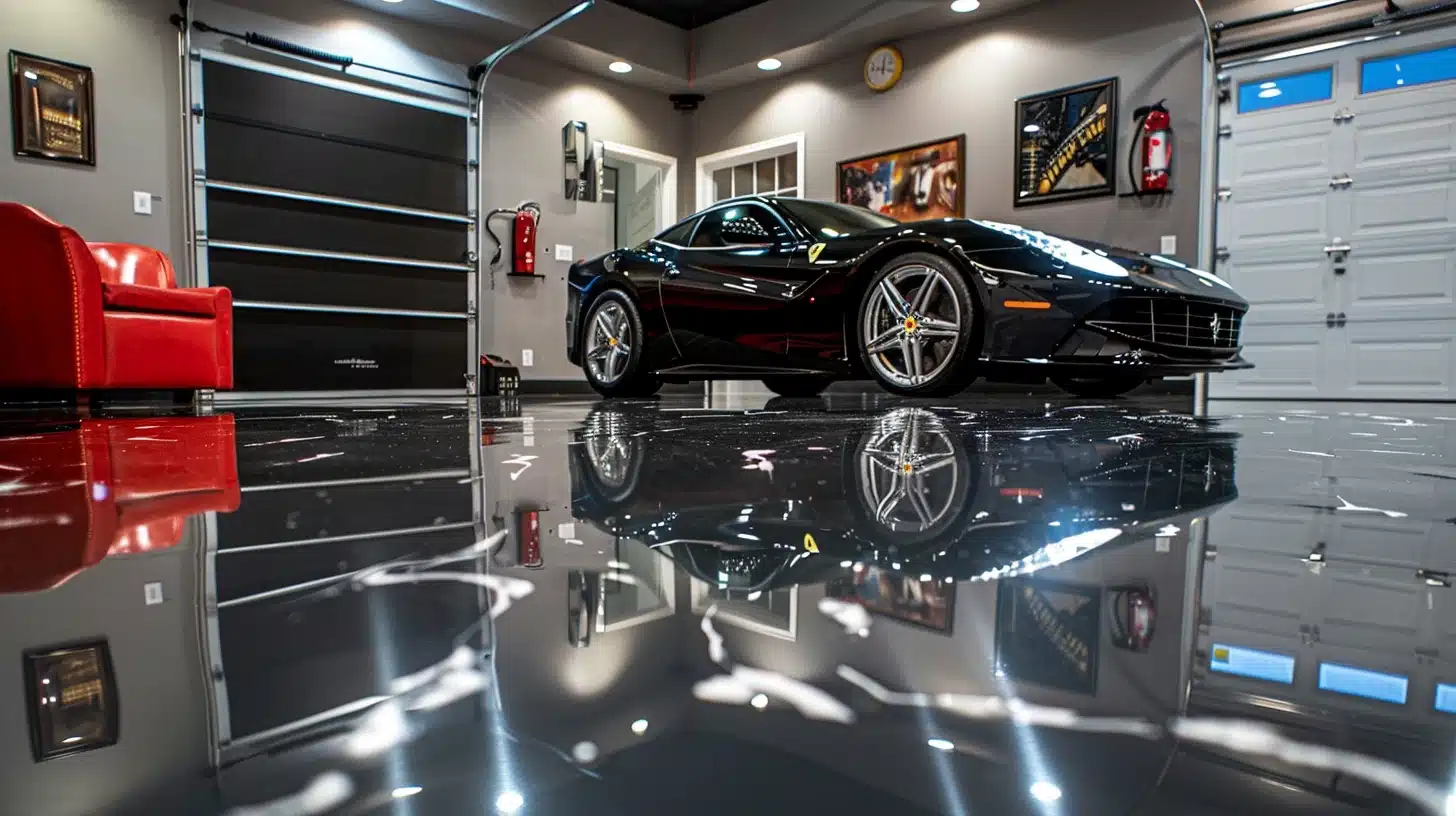Exploring the Top Garage Floor Coating Options
Your garage floor withstands heavy traffic, spills, and constant wear and tear, making it essential to invest in a durable and reliable coating. With a myriad of options available, it can be challenging to determine which garage floor coating is best suited for your needs. From materials and durability to ease of installation and maintenance, we’ll delve into the top choices to help you make an informed decision for your garage.
Considerations
Material: Foundation of Performance
The material of your garage floor coating plays a crucial role in its overall performance and longevity. Common options include epoxy, polyurea, and acrylic coatings, each with its own set of advantages and drawbacks. Understanding the characteristics of each material can help you choose the best option for your specific requirements.
Durability: Standing the Test of Time
Durability is paramount when selecting a garage floor coating, as it must withstand heavy vehicles, chemical spills, and abrasions. Look for coatings with high resistance to impact, abrasion, and chemicals to ensure long-lasting protection for your garage floor. Consider factors such as thickness, hardness, and resistance to UV rays to gauge the durability of different coating options.
Ease of Installation: Simplifying the Process
The ease of installation can significantly impact your overall experience with a garage floor coating. Some coatings require extensive surface preparation and multiple coats, while others offer quick and straightforward application processes. Evaluate the installation requirements of each option, including surface preparation, curing time, and specialized tools or equipment needed.
Maintenance: Keeping it Clean and Pristine
Regular maintenance is essential to preserve the appearance and performance of your garage floor coating. Opt for coatings that are easy to clean and resistant to stains, oil, and other common garage contaminants. Consider factors such as ease of sweeping, mopping, and spot cleaning to minimize maintenance efforts and keep your garage floor looking pristine.
Cost: Balancing Budget and Quality
Cost is a significant consideration when choosing a garage floor coating, as prices can vary widely depending on the material, quality, and installation requirements. While epoxy coatings tend to be more affordable upfront, they may require additional maintenance and recoating over time. Polyurea coatings offer superior durability but come with a higher price tag. Evaluate your budget and long-term maintenance costs to find the best balance between affordability and quality.
Choose a Coating
Epoxy Coating
Pros of Epoxy Coating
- Durability: Epoxy coatings are highly durable and can withstand heavy traffic, impacts, and abrasions, making them ideal for garage floors.
- Chemical Resistance: Epoxy coatings offer excellent resistance to chemicals, including oil, grease, gasoline, and household cleaners, preventing stains and damage.
- Aesthetic Appeal: Epoxy coatings are available in a wide range of colors, finishes, and decorative options, allowing homeowners to customize their garage floors to suit their preferences.
- Easy to Clean: Epoxy-coated garage floors are easy to clean and maintain, requiring only regular sweeping and occasional mopping to keep them looking pristine.
- Longevity: When properly applied and maintained, epoxy coatings can last for many years, providing long-term protection and enhancing the lifespan of the underlying concrete floor.
Cons of Epoxy Coating
- Preparation Requirements: Achieving a high-quality epoxy coating requires thorough surface preparation, including cleaning, etching, and repairing cracks and imperfections, which can be time-consuming and labor-intensive.
- Application Challenges: Epoxy coatings must be applied under specific temperature and humidity conditions, and proper mixing and application techniques are crucial to ensure adhesion and durability.
- Curing Time: Epoxy coatings require sufficient curing time to achieve their full strength and durability, typically ranging from 24 to 72 hours, during which the garage cannot be used.
- Vulnerability to Moisture: Epoxy coatings are not fully resistant to moisture and may delaminate or peel if exposed to excessive moisture or water intrusion, especially in areas with poor drainage or frequent water exposure.
- Potential for Slipperiness: Depending on the type of finish and additives used, epoxy-coated garage floors can be slippery when wet, posing a safety hazard, especially in high-traffic areas or near vehicle entry points. Applying non-slip additives or choosing a textured finish can mitigate this risk.
Polyurea
Pros of Polyurea Coatings
- Exceptional Durability: Polyurea coatings are known for their outstanding durability, offering superior resistance to abrasions, impacts, and chemical spills compared to other garage floor coating options.
- Fast Curing Time: Polyurea coatings cure rapidly, often within a few hours, allowing for quick installation and minimal downtime. This makes them an ideal choice for homeowners who want to return to using their garage as soon as possible.
- Flexible Application: Polyurea coatings can be applied in a wide range of temperatures and humidity levels, making them suitable for use in various climates and environments. They also adhere well to different substrates, including concrete, wood, and metal.
- UV Stability: Polyurea coatings are highly resistant to UV radiation, ensuring long-lasting color and finish retention even when exposed to sunlight. This makes them ideal for outdoor applications or garages with windows or skylights.
- Low Maintenance: Polyurea-coated garage floors are easy to clean and maintain, requiring minimal upkeep to preserve their appearance and performance. They are resistant to stains, oil, grease, and other common garage contaminants.
Cons of Polyurea Coatings
- Cost: Polyurea coatings tend to be more expensive than other garage floor coating options, such as epoxy and acrylic, due to their advanced formulation and superior performance characteristics.
- Professional Installation Required: While DIY kits for polyurea coatings are available, achieving a high-quality finish often requires professional installation. Improper application can lead to adhesion issues, bubbling, or premature coating failure.
- Limited Color Options: Compared to epoxy coatings, which offer a wide range of colors and decorative finishes, polyurea coatings may have more limited color options available. However, custom color matching is possible with some manufacturers.
- Odor During Application: Polyurea coatings can emit strong odors during the application process, which may require adequate ventilation or temporary relocation until the coating has cured. However, some formulations are low-odor or odorless.
- Potential for Slipperiness: Depending on the finish and texture chosen, polyurea-coated garage floors may be slippery when wet. Adding non-slip additives or selecting a textured finish can enhance traction and improve safety.
Acrylic
Pros of Acrylic Coatings
- Affordability: Acrylic coatings are typically more budget-friendly compared to epoxy and polyurea options, making them a cost-effective choice for homeowners on a tight budget.
- Ease of Application: Acrylic coatings are relatively easy to apply, making them suitable for DIY projects. They can be rolled or sprayed onto the garage floor with minimal preparation, reducing labor costs and time.
- Quick Drying Time: Acrylic coatings have a fast drying time, allowing for rapid installation and minimal downtime. In some cases, the garage floor can be ready for use within a day of application.
- UV Resistance: Acrylic coatings offer good resistance to UV radiation, helping to prevent color fading and yellowing over time. This makes them suitable for outdoor applications or garages with exposure to sunlight.
- Low Maintenance: Acrylic-coated garage floors are easy to clean and maintain, requiring minimal upkeep to preserve their appearance and performance. They are resistant to stains, oil, grease, and other common garage contaminants.
Cons of Acrylic Coatings
- Durability: While acrylic coatings provide a protective layer for the garage floor, they are not as durable as epoxy or polyurea coatings. They may be more prone to chipping, scratching, and wear over time, especially in high-traffic areas.
- Limited Chemical Resistance: Acrylic coatings have limited resistance to chemicals, such as oil, gasoline, and harsh cleaning agents. Exposure to these substances can cause staining, discoloration, or damage to the coating.
- Shorter Lifespan: Acrylic coatings typically have a shorter lifespan compared to epoxy and polyurea coatings. They may require more frequent recoating or maintenance to maintain their appearance and performance over time.
- Less Versatile: Acrylic coatings may be less versatile in terms of customization options compared to epoxy and polyurea coatings. They may have fewer color choices and decorative finishes available.
- Prone to Water Damage: Acrylic coatings are not fully waterproof and may be susceptible to water damage if exposed to excessive moisture or water intrusion. This can lead to delamination or peeling of the coating, especially in areas with poor drainage.

